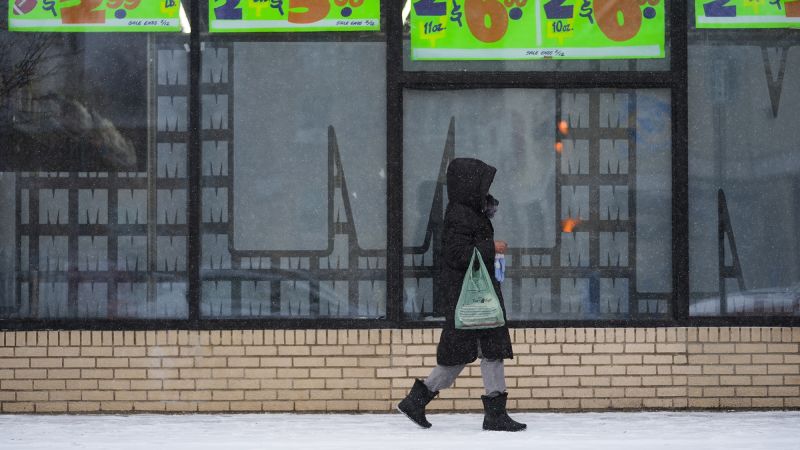CNN
—
America’s economic engine is running a little rough these days.
Consumer confidence is cratering, debt burdens are growing, people are worrying more about their jobs and they’re pulling back on some spending out of caution.
Still, while the overall fundamentals that prop up the consumer remain solid, the risks have heightened significantly.
High inflation and high interest rates have contributed to vulnerabilities among consumers, making them all the more susceptible at a time when the sheer unpredictability of the Trump administration’s policies — including massive tariffs that are projected to result in higher prices — are chilling spending and investment plans.
“The consumer sees darkening clouds for the economy ahead,” Chris Rupkey, chief economist at FwdBonds, wrote last Friday after two closely watched economic reports painted a pained picture of the American consumer.
The Commerce Department reported that inflation-adjusted consumer spending rose just 0.1% in February as Americans shored up their savings accounts, while a separate survey showed that consumer sentiment plunged 12% in March.
“And while they may not always be right, if they do not start spending again, this latest negative reading on confidence will become a reality,” Rupkey added.
Consumer spending powers more than two-thirds of the nation’s economic activity; so if that engine falters, the economic consequences can start spiraling.
“Consumers, they need willingness and ability,” Dan North, senior economist at Allianz Trade North America, told CNN. “The willingness (consumer confidence) they don’t have; the ability (the income) is waning away.”
While Friday’s Commerce Department data showed that personal income posted solid gains for the second consecutive month, real (inflation-adjusted) income after taxes is up just 1.8% year-over-year.
“That’s pretty weak,” North said. “It’s not zero, but it’s pretty weak.”
If both disposable income and confidence are decaying, drops in core spending are likely to follow, he said.
However, it also remains unclear whether the tepid January and February spending were reflections of recessionary or inflationary fears or if they were merely a step back after a purchasing surge in the finals months of last year, said Shannon Grein, Wells Fargo economist.
“While real spending came in weak, and we had some downward revisions to the prior month’s data, I just think it’s a little too soon to write off the consumer,” Grein said.

Wages continue to outpace inflation, and overall income growth has been strong thanks to a still-tight labor market.
However, a lot is riding on the continued health and stability of the jobs market.
“That’s the big risk: Does this labor market data begin to turn in a way that causes consumers to really pull back on spending?” she said. “But the ultimate fundamental for the household sector is income, and that’s still in a decent position.”
Still, Grein cautions, that’s not the case for all households.
An ongoing theme of the post-pandemic recovery has been a widening bifurcation of American household finances. Lower-income and younger consumers are struggling more, living paycheck to paycheck and stand to face the brunt of tariff pressure, she said.
Debt balances have been on the rise, along with delinquencies.
“We see that lower-income and younger borrowers are driving those delinquency rates higher — they’ve maxed out,” she said.
However, on a macro level, the health of consumers’ mortgage loans — which are the largest component of overall US household debt — are serving as a notable offset, she added.
“Mortgage delinquencies are only approaching pre-Covid levels, where they were sitting at historic lows,” she said. “The equity held in the single-family housing market is still near an all-time high.”
Still, she cautioned, the longer the uncertainty continues to drag on, the greater the chances that it could make people and businesses “act in funky ways.”
“I think the uncertainty of it just leads to more behavioral outcomes than just a simple implementation of a tariff could or would,” she said. “The recent data are posing this question of, ‘Is this all just temporary tariff effects, where people are just trying to act on the uncertainty?’ Or is this a new sign of weakness that’s finally showing up in the data?”
And while a recession is not the base case for Grein nor Wells Fargo, an overall cooldown is likely.
“I am bracing for a slowdown in growth, just based on this wait-and-see approach that’s happening for businesses, households and the [Federal Reserve],” she said. “I don’t think we’re too far gone, but I do get more worried the longer this uncertainty persists from a growth perspective.”
Victor Yarbrough is cognizant of that widening gap. He’s one of three brothers behind Brough Brothers Distillery, the first Black-owned bourbon distillery in Kentucky.
Brough Brothers’ original distillery is located where the brothers grew up — Louisville’s West End, a section of town that was once considered a “Harlem of the South” but has suffered economically, especially in recent decades.
Times appear to be getting harder for some residents, Yarbrough said in an interview with CNN.
“Two blocks away, there’s a church that has food drives, we’ve seen a lot more people carrying food baskets away each time,” he said. “That’s telling me that for a lot of people — even in an economically depressed area — things are getting worse.”
At the same time, Brough Brothers is in the midst of a massive expansion that includes a second, larger facility — complete with an event space — across town and has been planning (until just recently) to broaden its international distribution. The European Union and Canada’s retaliatory tariffs on American whiskey and bourbon have thrown those plans into disarray.
Yarbrough said his company is doing everything it can to adapt but is concerned about how his customers will be able to navigate these times if prices of many goods go up.
“We’re very competitively priced, but the reality is, if people don’t have jobs, then they can’t spend,” he said. “We’re not a necessity. We’re not like eggs and milk.”


